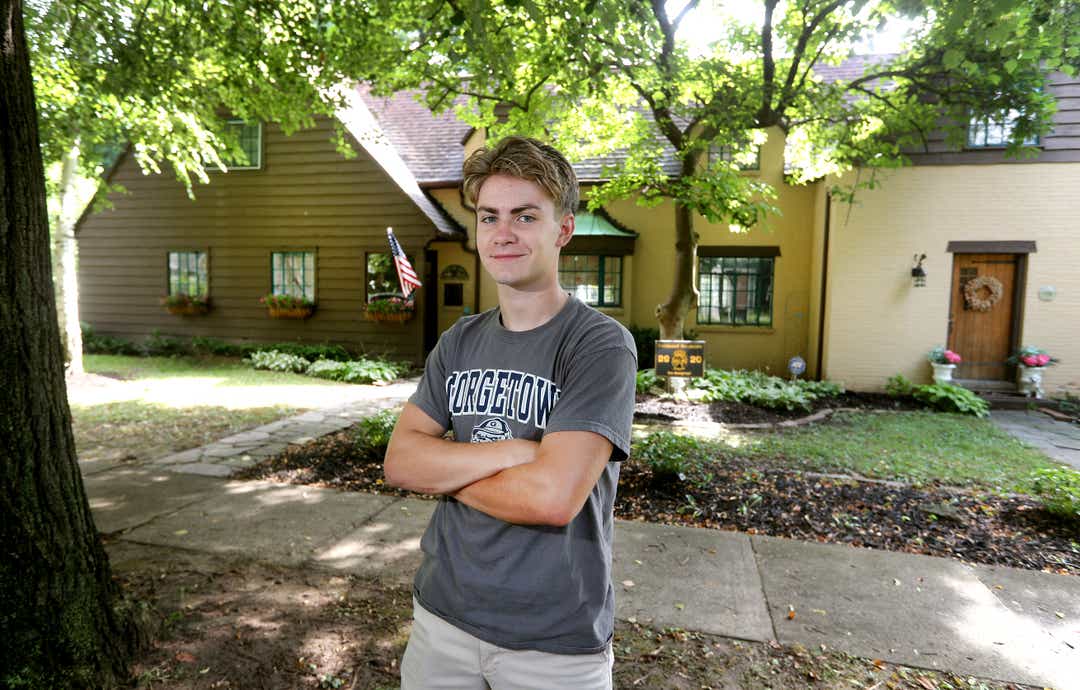The second week of August was the time for goodbyes. One by one, Casey Howlett's classmates at McQuaid Jesuit High School Class of 2020 departed for their chosen colleges with many of his friends attending Penn State and Auburn University.
But Howlett will not be headed to college this fall. Instead, he will be taking online classes from his Brighton home as his college, Georgetown University in Washington, D.C., opted to go entirely online in fall; a change from previous hybrid plans that would have brought some students to campus while others stay home.
For Howlett, seeing his friends get the full college experience while he is home tops off an already difficult year, with his senior high school events canceled.

"It all just keeps adding up," said Howlett, 18. "I knew headed in there was a low chance of getting on campus. I really wanted to experience Georgetown."
When it comes to college re-opening their campuses for in-person learning and dorm life, it has been a mixed bag. Some universities are reversing their plans for in-person learning, while others are letting students on campus. Others like University of North Carolina at Chapel Hill canceled in-person classes after an outbreak of covid cases.
The policies vary from school to school and geography is not a factor. Columbia University in the Morningside Heights neighborhood of Manhattan announced this month that all undergraduate classes would be conducted remotely, while New York University in the Greenwich Village neighborhood of Manhattan is going forward with its hybrid learning plan allowing some students back on campus and dorms. Both universities attract a national and international pool of students.
How do schools decided whether to stay open or go all virtual? The answer may be in the brand.
Enrollment pressures with a drop in international students and freshmen deferring impact some colleges more so than others. Extreme selective schools with a wider geographic draw are less vulnerable.
"They absolutely use brand awareness to make these calls," said Jacque Discenza, owner and college consultant at Sarphatie Education Inc., in Rochester.
Uncertainty over the pandemic have wreaked havoc in many of her students' lives. Many returning college students have leased apartments off campus and are now forced to stay just to pay rent, she said.
More: COVID what’s next: Colleges prepare, students wait for what happens this fall
More: 'Peer pressure could swing either way': Waiting game begins as students return to campus
Stay or go?
Brighton resident Lily Glaser, 19, is preparing to start her freshman year at Barnard College of Columbia University online in September after taking a gap year. Another gap year is out of the question so she is making the best of the situation.
Glaser is living at home with her mom, Jamie Columbus, but she is thinking about looking for an apartment in Westchester and taking online classes while living on her own. A graduate of The Harley School class of 2019, Glaser said most of her friends are away at college.
Tuition at Barnard College of Columbia University is $55,781 for the 2020 to 2021 academic year, reflecting the switch to remote learning. Glaser's mom Jamie said she doesn't mind paying the money for online classes because it is helping the school get through a very difficult time.
Meanwhile, Colin Quattrini, Brighton High School class of 2020, is preparing to move into his dorm room at New York University on Aug. 31. He is a drama student at Tisch School of the Arts and his drama classes will be online three days a week.
"I'm glad I still get a chance to experience the city," Quattrini said.
The estimated cost of attendance at NYU is $78,742 for tuition, room, board and fees. Quattrini said he is not receiving any financial aid.

Worth the cost?
Instead of returning to University of Southern California as a sophomore, Nick Zappia, 19, is staying at his family's Rochester home.
Zappia was considering taking courses at Monroe Community College, but he said USC does not take transfer credits from other schools once a student starts there. He believes the school should charge less for the online courses.
"I feel a lot of the experience is on campus," Zappia said.
At the Howlett home, the family is preparing a separate area for Casey to start his virtual classes from Georgetown. Casey Howlett applied for two grants for remote learning and the family feels confident in the school's remote learning plan.
Casey Howlett was initially waitlisted at Georgetown, his top choice school. He took the SAT four times to hit his goal and took several AP classes that enhanced his academic record while serving as captain of the McQuaid football team.
"He has worked so hard," his mom Lynn Flannery Howlett said. "I need to do what I can to support him."
Flannery Howlett believes the short term sacrifice of online classes and missing out on the full college experience will be worth it. The tuition for the fall semester for students who are studying at Georgetown remotely is $25,823. The cost of a spring semester of remote learning at Georgetown hasn't been released yet.
"You still get a Georgetown degree," she said.
Wait and see
For parents whose children are currently enrolled in physical classes in college, some are taking a wait-and-see attitude. Rochester resident Paul Kingsley sent his son Alec off to University of Rochester this month knowing that he may return home if there is an outbreak. While he understands that some parents see teaching remotely as less demanding and not worth the money, having examined the plans at University of Rochester Kingsley is confident that his son will still have an enriched learning experience if he has to take classes remotely.
"I've seen the investment in software and other tools as well as the efforts by faculty," Kingsley said.
While the experience may be different for students, time and effort are being put into the best possible education experience in this most unusual year, Kingsley said.
Mary Chao is the retail and real estate reporter at Democrat and Chronicle. Email tips to mchao@Gannett.com. Your subscription supports our journalism.
"some" - Google News
August 25, 2020 at 04:07PM
https://ift.tt/31rlih5
Stuck at home paying $50,000 tuition. Why some Rochester college students say it makes sense - Rochester Democrat and Chronicle
"some" - Google News
https://ift.tt/37fuoxP
Shoes Man Tutorial
Pos News Update
Meme Update
Korean Entertainment News
Japan News Update
Bagikan Berita Ini














0 Response to "Stuck at home paying $50,000 tuition. Why some Rochester college students say it makes sense - Rochester Democrat and Chronicle"
Post a Comment